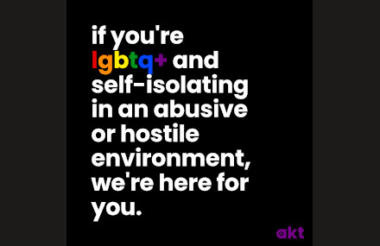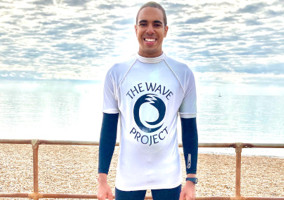Covid-19 has exposed and heightened the inequities that were always present in our society. My experiences as a campaigns, policy and research officer for a national LGBTQ+ youth homelessness charity that works predominately with people of colour have made this even clearer to me.
akt has support centres in London, Newcastle, Bristol and Manchester and works with young people (between the ages of 16-25) who are homeless or at risk of experiencing homelessness living in hostile and abusive environments. We provide safe homes, advocacy and support for young people who have mostly become homeless because of the rejection they face after coming out to their families. Most of our young people are “hidden homeless” experiencing homelessness in a more transient manner, often relying on sofa surfing to find somewhere to stay.
Lockdown has made sofa surfing impossible. This has meant that there have been effectively two “choices” for LGBTQ+ youth. The first choice is staying in a hostile or abusive environment where they are continuously subjected to homophobic, biphobic or transphobic abuse. We are deeply concerned about what this means for the mental health of our young people, many of whom will be navigating through complex trauma and PTSD.
The second choice for young people is to leave their household and seek assistance from local authorities. This will likely mean that they will face significant obstacles before they are given assistance. For example, they may end up being placed back into an abusive household due to a lack of understanding of how LGBTQ+ youth experience domestic and parental abuse. Moreover, as the focus has been on assisting those experiencing rough sleeping, they may face significant difficulty in getting immediate help.
What happens next?
So what happens next if they decided to go with the second choice? They may find themselves sleeping rough. Now, if they identify as a man and are a person of colour, or are black, in particular, navigating through racial prejudice would mean that they would likely end up sleeping rough for an extended period of time. As we know from stop and search figures, this is a practise that is disproportionately applied to black young men.
This means that many of our young people are subjected to stop and search and routinely asked to move locations by police or face arrest. To get support from local authority housing teams you need to be bedded down in one location.
They may also find themselves placed in emergency accommodation, similar to what was made available under the government’s Everyone In directive. We know that there has not been sufficient monitoring of key demographic information such as sexual orientation and gender identity when placing people into accommodation. This presents a potentially unsafe situation for LGBTQ+ youth, who may find themselves in an environment where they are subjected to prejudicial abuse.
If you’re a person of colour, you also must worry about the additional risk to your safety because of racism. For many LGBTQ+ youth, this has meant that they could not stay in emergency accommodation.
Policy change needed
So what has all of this meant and what policy change do we need to see?
At the start of the pandemic we saw a 37% rise nationally in our referrals, a 107% increase in referrals in our London support centre and have continued to see a sustained increase in the number of young people rough sleeping. As an organisation, we have had to rapidly adapt to cope with this rise in demand.
For example, we have recruited three new caseworkers and an assistant director of services. We have also focused on expanding of digital service offer by creating an online support hub and e-mentoring service. For fundraising, our #aktogether appeal is an example of how we have been able to use the funds raised to provide essential food and hygiene supplies for our young people who have been struggling financially during the pandemic.
In terms of our public affairs work, it has not always been so easy to influence when political discourse has been largely concentrated on rough sleeping. Going forward, we need to see a stronger focus on prevention and the needs of those who experience all types of homelessness. It is crucial that we place an intersectional lens when looking at solutions to ending homelessness, focusing on the multiple layers of discrimination that LGBTQ+ young people face and people of colour.
To solve immediate issues, we need to see stronger protections for renters to prevent evictions during the pandemic, LGBTQ+ friendly temporary accommodation and a stronger welfare safety net for young people.
However, if we are serious about ending LGBTQ+ youth homelessness we need the monitoring of gender identity and sexual orientation in publicly commissioned housing services to be made mandatory.
Currently, the monitoring of this information is up to the discretion of local authorities. This means that if you asked me about current levels of LGBTQ+ youth homelessness nationally, I would not be able to give you an accurate answer. Without mandatory monitoring the voices and needs of LGBTQ+ young people will continue to be side-lined in discussions about the solutions to ending homelessness.
Jo Bhandal is campaigns, policy and research officer at akt
Related articles












